新概念第二课第三课重点讲解
新概念英语第2册第3课重点语法句型

新概念英语第2册第3课重点语法句型第3课的内容:一、重要句型或语法1、时态复习一般过去时,表示过去发生的事情,如:The driver of that car hit that post over there.2、双宾动词1)双宾动词是指某些动词后面可以跟两个宾语,表物的为直接宾语,表人的为间接宾语。
2)注意区分双宾动词后间接宾语前用to还是for的区别,一般表示动作对某人而做用to,表示动作为某人而做用for。
如:He passed the salt to me. / She bought the tie for me.二、课文主要语言点Postcards always spoil my holidays. spoil在文中表示“破坏”,也可以表示“宠坏”,如:He is spoiled by his parents. 他被父母宠坏了。
Last summer, I went to Italy. last summer后面用了逗号,主要是为了突出作者去年暑假所做的事情。
注意Italy的读音。
I visited museums and sat in public gardens. 注意区分garden和park。
文中之所以用public来修饰garden,主要是因为garden一般是指私家房子前后院的花园,而park 一般是指供居民休闲的公共绿地。
A friendly waiter taught me a few words of Italian. friendly为形容词,其构词方式:名词+ly。
注意:“副词+ly”构成副词。
teach为双宾动词,所以其短语可改为:taught a few words of Italian to me。
注意Italian的读音。
Then he lent me a book. lend是双宾动词,一般用作:lend sb. sth.,也可以用作:lend sth. to sb.。
新概念英语二第三课
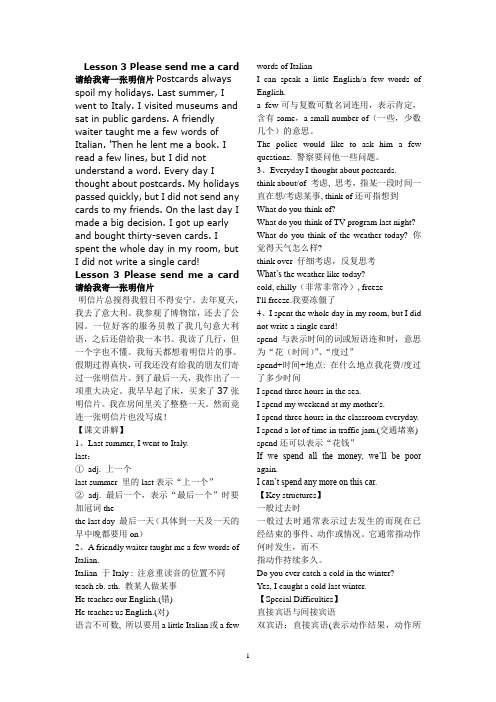
Lesson 3 Please send me a card 请给我寄一张明信片Postcards always spoil my holidays. Last summer, I went to Italy. I visited museums and sat in public gardens. A friendly waiter taught me a few words of Italian. 'Then he lent me a book. I read a few lines, but I did not understand a word. Every day I thought about postcards. My holidays passed quickly, but I did not send any cards to my friends. On the last day I made a big decision. I got up early and bought thirty-seven cards. I spent the whole day in my room, but I did not write a single card!Lesson 3 Please send me a card 请给我寄一张明信片明信片总搅得我假日不得安宁。
去年夏天,我去了意大利。
我参观了博物馆,还去了公园。
一位好客的服务员教了我几句意大利语,之后还借给我一本书。
我读了几行,但一个字也不懂。
我每天都想着明信片的事。
假期过得真快,可我还没有给我的朋友们寄过一张明信片。
到了最后一天,我作出了一项重大决定。
我早早起了床,买来了37张明信片。
我在房间里关了整整一天。
然而竟连一张明信片也没写成!【课文讲解】1、Last summer, I went to Italy.last:①adj. 上一个last summer 里的last表示“上一个”②adj. 最后一个,表示“最后一个”时要加冠词thethe last day 最后一天(具体到一天及一天的早中晚都要用on)2、A friendly waiter taught me a few words of Italian.Italian 于Italy : 注意重读音的位置不同teach sb. sth. 教某人做某事He teaches our English.(错)He teaches us English.(对)语言不可数, 所以要用a little Italian或a few words of ItalianI can speak a little English/a few words of English.a few可与复数可数名词连用,表示肯定,含有some,a small number of(一些,少数几个)的意思。
新概念英语第二册Lesson3详解共43页文档
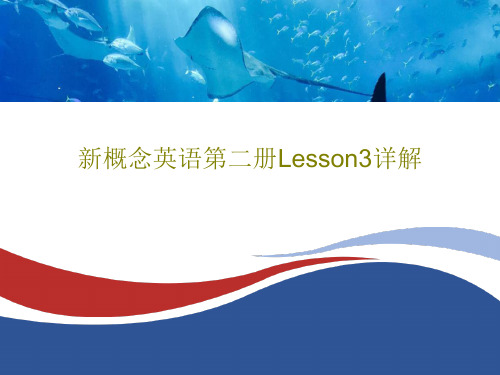
16、人民应该为法律而战斗,就像为 了城墙 而战斗 一样。 ——赫 拉克利 特 17、人类对于不公正的行为加以指责 ,并非 因为他 们愿意 做出这 种行为 ,而是 惟恐自 己会成 为这种 行为的 牺牲者 。—— 柏拉图 18、制定法律法令,就是为了不让强 者做什 么事都 横行霸 道。— —奥维 德 19、法律是社会的习惯和思想的结晶 。—— 托·伍·威尔逊 20、人们嘴上挂着的法律,其真实含 义是财 在哪里。——西班牙
37、我们唯一不会改正的缺点是软弱。——拉罗什福科
xiexie! 38、我这个人走得很慢,但是我从不后退。——亚伯拉罕·林肯
39、勿问成功的秘诀为何,且尽全力做你应该做的事吧。——美华纳
40、学而不思则罔,思而不学则殆。——孔子
新概念第二课第三课重点讲解

Lesson 3 Please Send Me a Card【New words and expressions】生词和短语(11)send v. 寄,送postcard n. 明信片spoil v. 使索然无味,损坏museum n. 博物馆public adj. 公共的friendly adj. 友好的waiter n. 服务员,招待员lend v. 借给decision n. 决定whole adj. 整个的single adj. 唯一的,单一的★send v. 寄, 送send a letter 寄信send sth. to sb. /send sb. sth. 给某人送(寄)什么东西send/take children to school:take强调某人亲自送;send则是通过第三人去送, 如美国的校车take flowers to his wife 自己送send flowers to his wife 叫店里的人送★postcard n. 明信片两个爆破音在一起,前者失去爆破音。
这里/t/和/k/前者失去爆破音name card /visiting card 名片Here is my name card. (口语常用, 同时伴随着递出的动作) ID card 身份证(ID 身份)credit card 信用卡cash card 现金卡, 储蓄卡, 工资卡(不能透支的那种)★spoil(spoiled,spoilt) v. 使索然无味, 损坏①vt. 弄坏,损坏,糟蹋The sad news spoiled our weekend. 这不幸的消息使我们没能过好周末。
The rain spoiled the school sports. 这场雨把学校运动会弄得一团糟。
His arrival spoiled my holiday.②vt. 宠坏,惯坏,溺爱Don’t spoil your children. 不能太惯孩子。
新概念英语二第3课
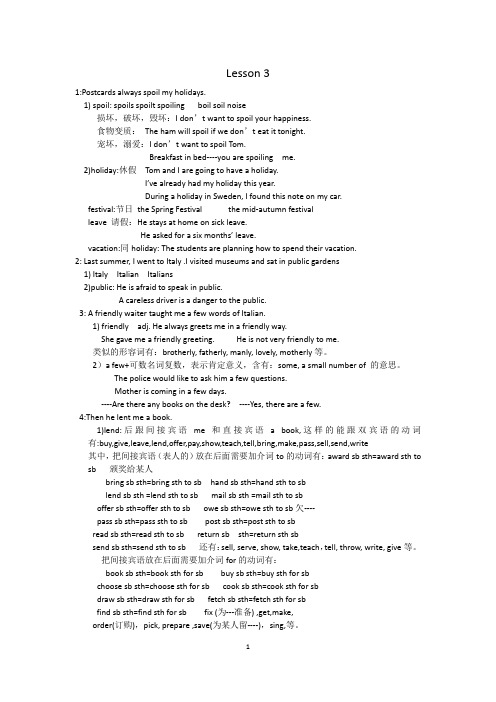
Lesson 31:Postcards always spoil my holidays.1) spoil: spoils spoilt spoiling boil soil noise损坏,破坏,毁坏:I don’t want to spoil your happiness.食物变质:The ham will spoil if we don’t eat it tonight.宠坏,溺爱:I don’t want to spoil Tom.Breakfast in bed----you are spoiling me.2)holiday:休假Tom and I are going to have a holiday.I’ve already had my holiday this year.During a holiday in Sweden, I found this note on my car.festival:节日the Spring Festival the mid-autumn festivalleave 请假:He stays at home on sick leave.He asked for a six months’ leave.vacation:同holiday: The students are planning how to spend their vacation.2: Last summer, I went to Italy .I visited museums and sat in public gardens1) Italy Italian Italians2)public: He is afraid to speak in public.A careless driver is a danger to the public.3: A friendly waiter taught me a few words of Italian.1) friendly adj. He always greets me in a friendly way.She gave me a friendly greeting. He is not very friendly to me.类似的形容词有:brotherly, fatherly, manly, lovely, motherly等。
新概念二第3课

这里有文艺复兴的罗曼蒂克,也有喝不完的美酒 ,欣赏着世界
最顶级的艺术作品。
4. Traditional romance - Kyoto, Japan 传统浪漫之都——日本京都 [kiˈəutəu] 5. Bursting (adj. 满怀的;充满的) with romance
- Bruges, Belgium. [bru:ʒ] ['beldʒəm] 浪漫无极限——比利时布鲁日
It is always the same on these occasions. 每逢这种场合,情况都这样。 当用occasion表示在某个/些场合时,它与介词on 连用 on these occasion(s)每逢这种场合 the same 表示情况相同
“绿色少年”是一个流行歌曲演唱团。目前他们 正在全国各地巡回演出,明天就要到达此地。他 们将乘火车来,镇上的大部分青年人将到车站迎 接他们。明晚他们将在工人俱乐部演出。“绿色 少年”准备在此逗留5天。在此期间,他们将演出 5场。同往常一样,警察的日子不好过,他们将设 法维持秩序。每逢这种场合,情况都这样。
try to do sth. 设法做某事, 尽力做某事 in order 井井有条 out of order 乱七八糟 order sb to do sth 命令某人做某事 order a meal 点餐 order a book 订购一本书 order a new suit for oneself为自己订购一套西服
6. Passionate in pink - Jaipur, India 粉色倾城——印度斋蒲尔 [,dʒai'puə] 印度“粉城” (Pink City) 的浪漫令人难忘,尤以 其雄伟壮观的宫殿和清幽脱俗的寺庙为甚。
新概念英语第二册Lesson3详解

Please send me a card
Revision: Lesson2
• Words
• Text • Gra2
Grammar:一般现在时
1.构成:使用动词原形,第三人称单数须有变化。 (1)直接加“s”, works,takes
(2)以辅音加“y”结尾,变“y”为“i”,再加 “es”, carry → carries
(3)以“s, x, ch, sh,o”结尾的动词加“es”, goes dresses watches brushes
2.功能: 在句中的位 (1)表现在的事实、状态或动作:置 : 实 义 动 eg: Birds fly. 词之前,非 • She loves music. 实义动词之 Mary's parents get up very early. 后 • (2)表习惯性动作或职业,常与 often,sometimes,usually,always, every week,seldom,frequently 等时间副词连用。 • eg: I always take a walk after supper. She writes to me very often. Tom and his girlfriend go out to take a picnic occasionally.
take和send的区别:
1. take强调某人亲自送。 2. send则是通过第三人去送,如校车。
B.按时间表示将要发生的动作或事件,用一般 现在时表达将来时概念。 • • The play begins at 6:30 this evening. When does the plane take off? He leaves for that city next week. According to the timetable, the express train to Shanghai starts at nine in the morning. (按照时刻表,开往上海的特快列车早上 7 点 出发。) 同样用法的动词有:go,come,leave,arrive, land,meet,die,start,return,join…
新概念英语第二册第3课课文详解及语法解析
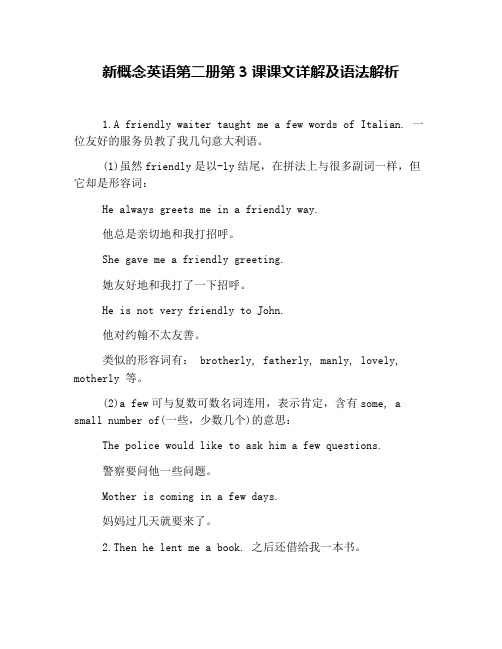
新概念英语第二册第3课课文详解及语法解析1.A friendly waiter taught me a few words of Italian. 一位友好的服务员教了我几句意大利语。
(1)虽然friendly是以-ly结尾,在拼法上与很多副词一样,但它却是形容词:He always greets me in a friendly way.他总是亲切地和我打招呼。
She gave me a friendly greeting.她友好地和我打了一下招呼。
He is not very friendly to John.他对约翰不太友善。
类似的形容词有: brotherly, fatherly, manly, lovely, motherly 等。
(2)a few可与复数可数名词连用,表示肯定,含有some, a small number of(一些,少数几个)的意思:The police would like to ask him a few questions.警察要问他一些问题。
Mother is coming in a few days.妈妈过几天就要来了。
2.Then he lent me a book. 之后还借给我一本书。
像send, buy, give等动词一样,lend能够有两个宾语:一个直接宾语(通常指物),一个间接宾语(通常指人)。
(cf. 本课语法)在这句话中,lend的直接宾语为a book,间接宾语为me。
Would you lend me your pen?能把你的笔借我用一下吗?Yesterday I lent my dictionary to Mary.昨天我把字典借给了玛丽。
3.…but I did not understand a word… 但我一个字也不懂。
not…a的否定意义比单用not要强。
课文的最后一句加了single,语气更强。
4.Every day I thought about postcards. 我每天都想着明信片的事。
新概念英语第二册第三课最全讲义

New words and expressions 生词与短语send v、寄,送postcard n、明信片spoil v、使索然无味,损坏museum n、博物馆public adj、公共得friendly adj、友好得waiter n、服务员,招待员lend v、借给decision n、决定whole adj、整个得single adj、唯一得,单一得Please Send Me a CardPostcards always spoil my holidays、Last summer, I went to Italy、I visited museums and sat in public gardens、A friendly waiter taught me a few words of Italian、Then he lent me a book、I read a few lines, but I did not understand a word、Everyday I thought about postcards、My holidays passed quickly, but I did not send cards to my friends、On the last day I made a big decision、I got up early and bought thirty-seven cards、I spent the whole day in my room, but I did not write a single card!【NEW WORDS AND EXPRESSIONS】★send v、寄,送send sth、to sb、/send sb、sthgive sb、sth、/give sth、to sb、send/take children to schooltake: 某人亲自送send: 通过第三人去送★postcard n、明信片send him a cardname card/visiting card : 名片Here is my name card、ID card:身份证credit card:信用卡cash card★spoil(spoiled or spoilt) v、使索然无味,损坏Don’t spoil the pleasure、You should not spoil your child、break: 打破spoil: 把东西得质量变得不好;生活中不顺心得事;宠坏,溺爱His parents spoiled the boy、宠坏This spoiled my day、What you said spoiled me、His arrival spoiled my holiday、damage: 破坏,程度不一定很重destroy:破坏,彻底摧毁★museum n、博物馆Palace Museum:故宫★public adj、公共得privatepublic school/place/house(pub:酒吧)in private: 私下里得in public: 公开得Why not have a conversation in public?★ Park 比较大Garden比较具有观赏价值,有不同风格得花园如Spanish garden, Italian garden private garden私家花园★friendly adj、友好得lovely adj、★waiter n、服务员,招待员waiterwaitresschief waitershop assistantattendant★ a few words 几句话I’d like to say a few words on the topic、Can I have a word with you? Have a word with sb就是固定搭配,与某人说句话★lend v、借给borrow from 向某人借lend sth、to sblend sb、sth、Can I borrow some money from you?Some people neither borrow nor lend、★decision n、决定v、decidemake a big/great decisione to a decision, arrive at a decision, reach a decision★whole adj、整个得all the、、、the whole、、、★single adj、唯一得,单一得DoubleThere wasn’t a single person on the beach、【课文讲解】The baby spoiled my night、Italian/Italy 意大利语意大利England English 英语French法语France法国German德语Germany德国Japanese日语Japan日本Spain西班牙Spanish西班牙语and 先后往往就是对等得概念teach sb、sth、a little ItalianI can speak a little English/a few words of Englishthink about: 考虑,思考think over : 仔细考虑last:表示"上一个"或"最后一个",表示"最后一个"时要加冠词theI spend the whole day in my room、spend+时间+地点I spend three hours in the sea、I spend my weekend at my mother's、I spend three hours in the classroom everyday、I spend a lot of time in traffic jam、reviewspoilsend/lend/teach sb、sth、send/lend/teach sth、to sb【Special Difficulties】翻译:1、她借了一本书给我。
新概念英语第二册Lesson3详解PPT43页
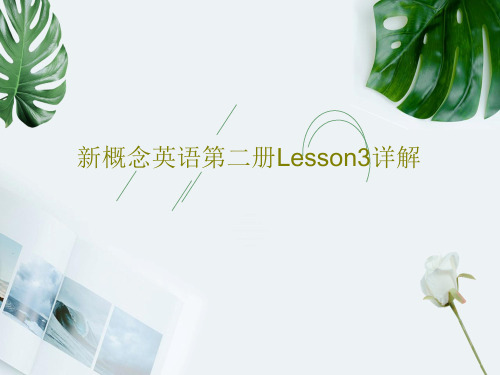
46、我们若已接受最坏的,就再没有什么损失。——卡耐基 47、书到用时方恨少、事非经过不知难。——陆游 48、书籍把我们引入最美好的社会,使我们认识各个时代的伟大智者。——史美尔斯 49、熟读唐诗三百首,不会作诗也会吟。——孙洙 50、谁和我一样用功,谁就会和我一样成功。—解
56、极端的法规,就是极端的不公。 ——西 塞罗 57、法律一旦成为人们的需要,人们 就不再 配享受 自由了 。—— 毕达哥 拉斯 58、法律规定的惩罚不是为了私人的 利益, 而是为 了公共 的利益 ;一部 分靠有 害的强 制,一 部分靠 榜样的 效力。 ——格 老秀斯 59、假如没有法律他们会更快乐的话 ,那么 法律作 为一件 无用之 物自己 就会消 灭。— —洛克
新概念英语第二册第三课课文详解
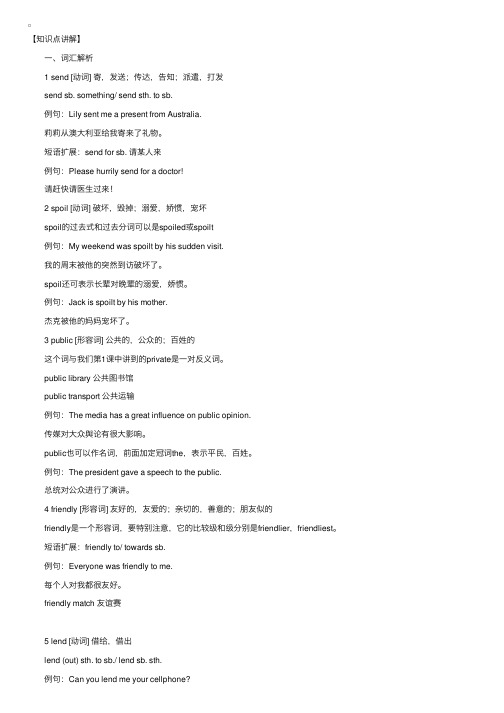
【知识点讲解】 ⼀、词汇解析 1 send [动词] 寄,发送;传达,告知;派遣,打发 send sb. something/ send sth. to sb. 例句:Lily sent me a present from Australia. 莉莉从澳⼤利亚给我寄来了礼物。
短语扩展:send for sb. 请某⼈来 例句:Please hurrily send for a doctor! 请赶快请医⽣过来! 2 spoil [动词] 破坏,毁掉;溺爱,娇惯,宠坏 spoil的过去式和过去分词可以是spoiled或spoilt 例句:My weekend was spoilt by his sudden visit. 我的周末被他的突然到访破坏了。
spoil还可表⽰长辈对晚辈的溺爱,娇惯。
例句:Jack is spoilt by his mother. 杰克被他的妈妈宠坏了。
3 public [形容词] 公共的,公众的;百姓的 这个词与我们第1课中讲到的private是⼀对反义词。
public library 公共图书馆 public transport 公共运输 例句:The media has a great influence on public opinion. 传媒对⼤众舆论有很⼤影响。
public也可以作名词,前⾯加定冠词the,表⽰平民,百姓。
例句:The president gave a speech to the public. 总统对公众进⾏了演讲。
4 friendly [形容词] 友好的,友爱的;亲切的,善意的;朋友似的 friendly是⼀个形容词,要特别注意,它的⽐较级和级分别是friendlier,friendliest。
短语扩展:friendly to/ towards sb. 例句:Everyone was friendly to me. 每个⼈对我都很友好。
新概念二Lesson3知识点整理

新概念二Lesson3知识点整理Lesson 3 Please send me a card请给我寄一张明信片学习目标全解必记单词send v. 寄,送sent v. ( send 的过去式和过去分词)postcard n. 明信片spoil v. 使索然无味,损坏( spoiled/spoilt) museum n. 博物馆public adj. 公共的friendly adj. 友好的waiter n. 服务员,招待生lend v. 借给decision n. 决定whole adj. 整个的single adj. 唯一的,单一的常考短语make a big decision 作出一项重大决定public gardens 公共花园,公园a few words of Italian 几句意大利语a few lines 几行lend me a book 借给我一本书a single card 一张明信片on the last day 在最后一天经典句型1.Then he lent me a book.2.I spent the whole day in my room.3.I thought about postcards.4.Postcards always spoil my holiday.5.My holiday passed quickly.6.A friendly waiter taught me a few words of Italian.重点语法1. 双宾语---------直接宾语和间接宾语直接宾语:表示动作结果,动作所涉及的事物间接宾语:动作目标,动作是谁做的或为谁做的,通常是人间接宾语大多数情况下置于直接宾语之前,假如间接宾语在后,间接宾主前必须加“to”(表示动作对什么人做)或“for”(表示动作为什么人而做,可以翻译成:给、替、为)。
例:Please give me a book.间接宾语直接宾语Please give a book to me.直接宾语间接宾语(a).常见动词与to相连的give, take, pass, read, sell, buy,pay,hand,bring,show,promise(承诺),offer(提供),owe (欠)(b).常见动词与for相连的buy, order(命令,点), make, find例:I buy a book for you .make a cake for you / find sth. for sb.do sb. a favor = do a favor for sb. 帮某人一个忙2. 单词辨析spoil, break, damage, destroy注:spoil主要指精神上的而其他三个多指物理上的破坏易混词辨析例句spoil 使索然无味,损坏;宠坏,溺爱,或指把东西的质量变得不好;生活中不顺心的事。
新概念第二册第三课

新概念第二册第三课
新概念第二册第三课的内容主要是关于饮食习惯和健康生活方
式的讨论。
以下是对该课的详细描述:
这一课的主题是关于饮食习惯和健康生活方式的重要性。
课文
以一位女士向医生咨询自己的健康问题为背景展开。
课文开始,女士向医生诉说自己感到疲劳和缺乏活力。
医生询
问她的饮食习惯和生活方式,并指出这些因素可能是她感到疲劳的
原因。
医生建议她改变饮食习惯和生活方式,以改善她的健康状况。
接下来,医生向女士解释了健康饮食的重要性。
他告诉她应该
多吃水果、蔬菜和全谷类食物,并减少摄入高脂肪和高糖分的食物。
医生还提到了均衡饮食的概念,即摄入适量的蛋白质、碳水化合物
和脂肪,以满足身体的需求。
此外,医生还建议女士增加运动量,以提高体能和心肺功能。
他解释了运动对健康的益处,并推荐女士每天至少进行30分钟的有
氧运动,如散步、慢跑或游泳。
医生还提到了保持良好的睡眠习惯的重要性。
他建议女士每晚
保持充足的睡眠时间,并避免过度疲劳。
最后,医生总结了健康饮食和生活方式的益处,包括提高身体
免疫力、预防慢性疾病和保持良好的心理状态。
通过这一课,读者可以了解到饮食习惯和生活方式对健康的重
要影响,并获得一些实用的建议来改善自己的生活方式,以达到更
健康的生活目标。
新概念2第三课知识点
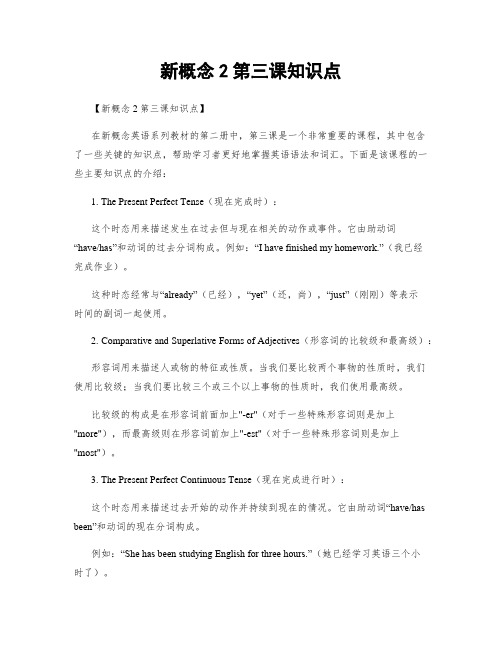
新概念2第三课知识点【新概念2第三课知识点】在新概念英语系列教材的第二册中,第三课是一个非常重要的课程,其中包含了一些关键的知识点,帮助学习者更好地掌握英语语法和词汇。
下面是该课程的一些主要知识点的介绍:1. The Present Perfect Tense(现在完成时):这个时态用来描述发生在过去但与现在相关的动作或事件。
它由助动词“have/has”和动词的过去分词构成。
例如:“I have finished my homework.”(我已经完成作业)。
这种时态经常与“already”(已经),“yet”(还,尚),“just”(刚刚)等表示时间的副词一起使用。
2. Comparative and Superlative Forms of Adjectives(形容词的比较级和最高级):形容词用来描述人或物的特征或性质。
当我们要比较两个事物的性质时,我们使用比较级;当我们要比较三个或三个以上事物的性质时,我们使用最高级。
比较级的构成是在形容词前面加上"-er"(对于一些特殊形容词则是加上"more"),而最高级则在形容词前加上"-est"(对于一些特殊形容词则是加上"most")。
3. The Present Perfect Continuous Tense(现在完成进行时):这个时态用来描述过去开始的动作并持续到现在的情况。
它由助动词“have/has been”和动词的现在分词构成。
例如:“She has been studying English for three hours.”(她已经学习英语三个小时了)。
这个时态通常与表示时间段的短语一起使用,比如“for three hours”(三个小时)或“since last night”(从昨晚开始)。
4. Prepositions of Time(表示时间的介词):介词用来在句子中表达时间、位置或方向等关系。
新概念二第三课讲解
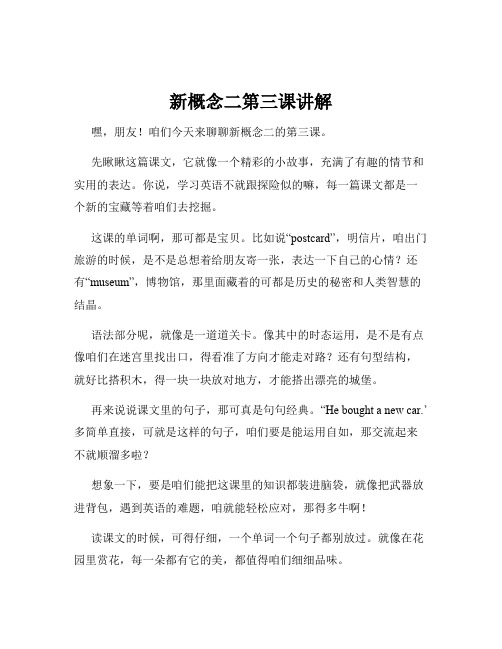
新概念二第三课讲解
嘿,朋友!咱们今天来聊聊新概念二的第三课。
先瞅瞅这篇课文,它就像一个精彩的小故事,充满了有趣的情节和实用的表达。
你说,学习英语不就跟探险似的嘛,每一篇课文都是一个新的宝藏等着咱们去挖掘。
这课的单词啊,那可都是宝贝。
比如说“postcard”,明信片,咱出门旅游的时候,是不是总想着给朋友寄一张,表达一下自己的心情?还有“museum”,博物馆,那里面藏着的可都是历史的秘密和人类智慧的结晶。
语法部分呢,就像是一道道关卡。
像其中的时态运用,是不是有点像咱们在迷宫里找出口,得看准了方向才能走对路?还有句型结构,就好比搭积木,得一块一块放对地方,才能搭出漂亮的城堡。
再来说说课文里的句子,那可真是句句经典。
“He bought a new car.’ 多简单直接,可就是这样的句子,咱们要是能运用自如,那交流起来不就顺溜多啦?
想象一下,要是咱们能把这课里的知识都装进脑袋,就像把武器放进背包,遇到英语的难题,咱就能轻松应对,那得多牛啊!
读课文的时候,可得仔细,一个单词一个句子都别放过。
就像在花园里赏花,每一朵都有它的美,都值得咱们细细品味。
练习部分也不能马虎,这就好比是练功,只有多练,招式才能熟练,功夫才能到家。
说到这,你是不是觉得新概念二的第三课其实没那么难,只要咱们
用心去琢磨,去体会,就能把它拿下?反正我是这么觉得的!
总之,新概念二第三课就像是一把钥匙,能帮咱们打开英语学习的
新大门。
只要咱们认真对待,努力学习,还怕学不好英语?别犹豫啦,赶紧行动起来吧!。
- 1、下载文档前请自行甄别文档内容的完整性,平台不提供额外的编辑、内容补充、找答案等附加服务。
- 2、"仅部分预览"的文档,不可在线预览部分如存在完整性等问题,可反馈申请退款(可完整预览的文档不适用该条件!)。
- 3、如文档侵犯您的权益,请联系客服反馈,我们会尽快为您处理(人工客服工作时间:9:00-18:30)。
Lesson 3 Please Send Me a Card【New words and expressions】生词和短语(11)send v. 寄,送postcard n. 明信片spoil v. 使索然无味,损坏museum n. 博物馆public adj. 公共的friendly adj. 友好的waiter n. 服务员,招待员lend v. 借给decision n. 决定whole adj. 整个的★send v. 寄, 送send a letter 寄信send sth. to sb. /send sb. sth. 给某人送(寄)什么东西send/take children to school:take强调某人亲自送;send则是通过第三人去送, 如美国的校车take flowers to his wife 自己送send flowers to his wife 叫店里的人送★postcard n. 明信片两个爆破音在一起,前者失去爆破音。
这里/t/和/k/前者失去爆破音name card /visiting card 名片Here is my name card. (口语常用, 同时伴随着递出的动作) ID card 身份证(ID 身份)credit card 信用卡cash card 现金卡, 储蓄卡, 工资卡(不能透支的那种)★spoil(spoiled,spoilt) v. 使索然无味, 损坏①vt. 弄坏,损坏,糟蹋The sad news spoiled our weekend. 这不幸的消息使我们没能过好周末。
The rain spoiled the school sports. 这场雨把学校运动会弄得一团糟。
His arrival spoiled my holiday.②vt. 宠坏,惯坏,溺爱Don’t spoil your children. 不能太惯孩子。
His parents spoiled the boy.spoil: 把东西的质量变得不好; 生活中不顺心的事;宠坏, 溺爱break: 打破; break the windows 打破玻璃damage: 破坏, 程度不一定很重destroy : 破坏, 彻底摧毁以上三个是指物理上的破坏, 而spoil主要指精神上的★museum n. 博物馆Palace Museum 故宫★public adj. 公共的①adj. 公共的,公众的,社会的There is a public library in this town.②adj. 公开的,众人皆知的Their secret meeting was made public 20 years later. 他们的秘密会晤20 年以后才被公开。
public place 公共场所in public 公开的;in private 私下里的Let’s have a conversation in private. 让我们私下谈谈?Why not have a conversation in public? 为什么不公开谈呢?(当面说呢?)③n. 公众,群众,大众The public is/are pleased with his explanation. 公众对他的解释很满意。
The museum is open to the public on Sunday.★friendly adj. 友好的friendly是形容词,单独使用时一般做定语;作为状语表示这个人做什么事情很友好, 用短语in a friendly wayShe gave me a friendly greeting.He always greets me in a friendly way.以-ly结尾的形容词还有lovely,brotherly,fatherly,manly,motherly★waiter n. 服务员, 招待员waiter(男服务员), waitress(女服务员), 只出现在餐馆里chief waiter 领班I want to see the chief waiter. 我要见你们的领班。
shop assistant 商店里的店员attendant n. (其他公共场所的)服务员★lend v. 借给lend to(借出):lend sth. to sb/lend sb. sth.Can you lend me $20 please? I’ll pay/give it back tomorrow.borrow from(借进):borrow sth. from sb./borrow sth. (borrow 不能用borrow sb sth.)He borrowed my pen yesterday. He hasn’t given me it yet.★decision n. 决定make /take a decision 作出决定It was not easy for me to make/take this decision.make a big/great decision (big:重大;great:伟大, 更重大) decide v. 决定★whole adj. 整个的a whole bottle of milk 一整瓶牛奶the whole…,the whole day 整天,two whole weeks 整整两星期all the…,all the day (the可省略) 整天all the week整个星期all the money所有的钱all of后面如果加代词, 代词前面不需要修饰词;一旦要加名词, 前面一定要加theall of us;all of the students★single adj. 唯一的, 单一的反义词: double 双倍的【Text】明信片总搅得我假日不得安宁. 去年夏天, 我去了意大利. 我参观了博物馆, 还去了公园. 一位好客的服务员教了我几句意大利语, 之后还借给我一本书. 我读了几行, 但一个字也不懂. 我每天都想着明信片的事. 假期过得真快, 可我还没有给我的朋友们寄过一张明信片. 到了最后一天, 我作出了一项重大决定.我早早起了床, 买来了37 张明信片. 我在房间里关了整整一天. 然而竟连一张明信片也没写成!【课文讲解】1、Last summer, I went to Italy.last:①adj. 上一个last summer 里的last表示“上一个”②adj. 最后一个,表示“最后一个”时要加冠词thethe last day 最后一天(具体到一天及一天的早中晚都要用on)2、A friendly waiter taught me a few words of Italian.Italian 于Italy : 注意重读音的位置不同teach sb. sth. 教某人做某事He teaches our English.(错) He teaches us English.(对)语言不可数, 所以要用a little Italian或a few words of ItalianI can speak a little English/a few words of English.a few可与复数可数名词连用,表示肯定,含有some,a small number of(一些,少数几个)的意思。
The police would like to ask him a few questions. 警察要问他一些问题。
3、Everyday I thought about postcards.think about/of 考虑, 思考,指某一段时间一直在想/考虑某事, think of还可指想到What do you think of the weather today? 你觉得天气怎么样?think over 仔细考虑,反复思考think it over4、I spent the whole day in my room, but I did not write a single card!spend与表示时间的词或短语连和时,意思为“花(时间)”、“度过”spend+时间+地点: 在什么地点我花费/度过了多少时间I spend my weekend at my mother's.spend还可以表示“花钱”If we spend all the money, we’ll be poor again.【Key structures】一般过去时与一般现在时【Special Difficulties】直接宾语与间接宾语双宾语:直接宾语(表示动作结果,动作所涉及的事物)和间接宾语(动作目标,动作是谁做的或为谁做的,通常是人) 。
动词+间接宾语大多数情况下置于直接宾语之前,如果间接宾语在后,间接宾主前必须加“to”(表示动作对什么人做)或“for”(表示动作为什么人而做)。
give sb. sth./give sth to sb间接宾语在后面时, 其前必须加to(对……而言)或for(为……而做)。
可以翻译为“给”、“替”、“为”的,就用for;如果只能翻译为“给”的, 就用to与to相连的give, take, pass, read, sell, buy,pay,hand,bring,show,promise,offer,owetake flowers to my wife.与for 相连的buy, order, make, find,doI buy a book for you .make a cake for youfind sth. for sb.I do something for you.do sb. a favor 帮某人一个忙Do me a favor please./Do a favor for me? 帮我一个忙Can I order something for you? Can I buy you a bottle of beer ? 意为我请你喝杯酒的意思【Multiple choice questions】4 ___a___ him a few words of Italian? The waiter.a. Who taughtb. Who did teachc. What did he teachd. Whom did he teach人做主语提问——who 对宾语提问——whomwho既可以对主语提问也可以对宾语提问, 而whom只能对宾语提问如果对主语提问, 则句子的语序和陈述句语序一样;如果对非主语来提问, 则句子要使用特殊疑问词+ 一般疑问句的语序Who/Whom did the waiter teach a few words of Italian?5 He was a friendly waiter. He spoke to the writer ___d___ .a. friendb. as friendsc. like friendsd. in a friendly wayHe spoke to the writer like a friend.in...way :以...方式, 作为状语表示这个人做什么事情很友好, 用短语in a friendly way7 He spent the whole day in his room. He was in his room ___c___ day.a. the holeb. the allc. alld. all ofall (the) dayall of 后面如果加代词, 代词前面不需要修饰词all of us;一旦要加名词, 前面一定要加theall of the friends,all of my friends,all of the students10 On the last day he made a big decision. It was the ___a___ day of his holiday.a. finalb. endc. latestd. bottomfinal——形容词end——名词/动词latest——形容词bottom——名词latest adj. 最新的latest news;latest style 新款11 He made a big decision. He ___b___ .a. thought about itb. made up his mindc. changed his mindd. made a wishthink about:考虑、思考、想make up one's mind:下定决心change one's mind:改变主意make a wish : 许个心愿, 愿望, 许愿Key to KS ExercisesA went (1.1); visited (I.2); sat (I.2); taught (1.2); lent;read (1.3); did not understand; thought (1.4); passed (1.5); didnot send (1.5); made; got up (1.6); bought (1.7); spent (1.7); did not write (1.8)C ⋯Roy died last year ⋯ left me ⋯ spent a lot of money⋯bought one or two⋯ never went to the cinema ⋯ stayed at home ⋯listened to music ⋯ often lent CDs ⋯ they kept them ⋯ lost many CDs ⋯Key to SD Exercises1 He paid some money to the shopkeeper.2 He handed the prize to me.3 The waiter brought the man a bottle of beer.4 He sold me all his books.5 The shop assistant found me some curtain material.6 He did a big favour for me.7 She showed her new hat to her husband.8 She promised the finder a reward.9 He gave some advice to his son.10 His uncle left some money to/for him.11 He is teaching us English.12 I bought you this bunch of flowers.13 Bring me that book please.14 He offered a cigarette to me.15 Read the first paragraph to me.16 I've ordered you some soup.17 I owe a lot of money to him.18 Pass your father the mustard.Key to Multiple choice questions1 c2 a3 c4 a5 d6 b7 c8 c9 b 10 a 11 b 12 bKey to Sentence structureI did not send any cards to my friends.。
